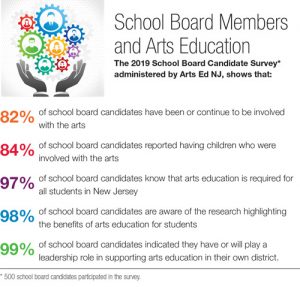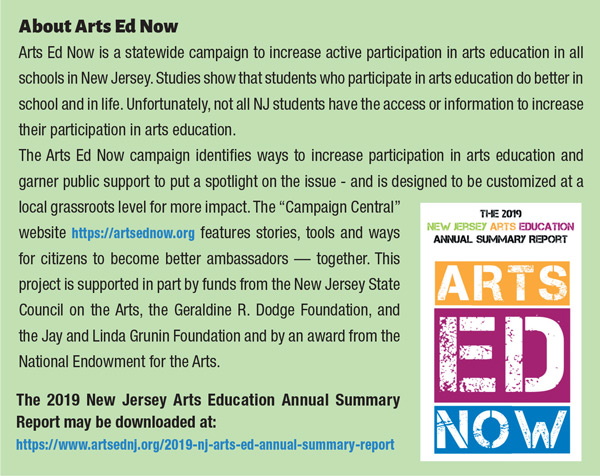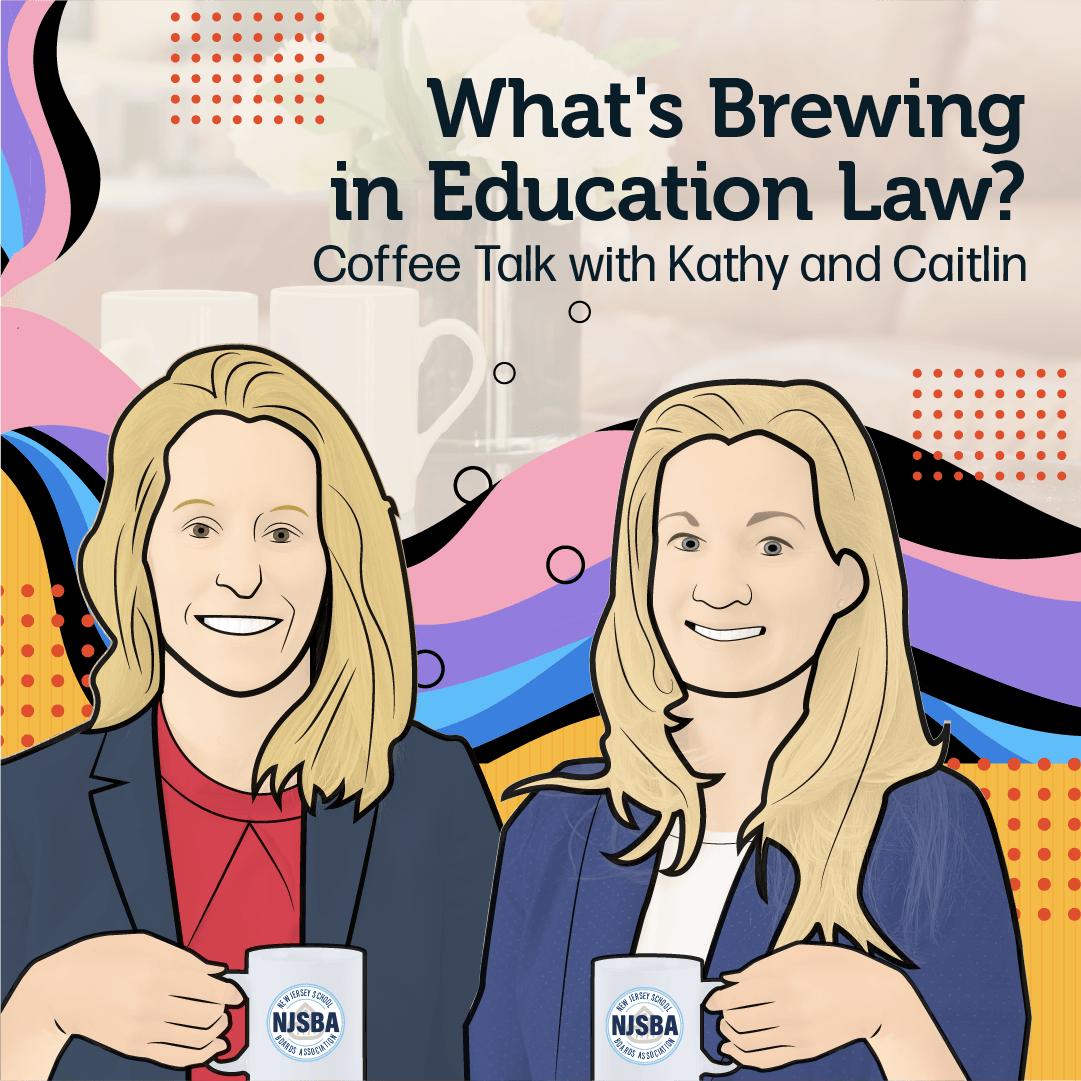New Jersey has become the first state in the nation to provide universal access to arts education for all public school students according to the 2019 New Jersey Arts Education Annual Summary Report released in fall 2019 by Arts Ed NJ. The review is based on data from the New Jersey State Department of Education (NJDOE) for the 2017-2018 school year. This is indeed a historic milestone for arts education, not only in New Jersey, but for our nation.
Universal access means all New Jersey public schools provide some form of arts education and every student who attends a public school in New Jersey has the opportunity to participate in arts education programs as part of the regular school day. Achieving universal access to arts education has been the number one goal of Arts Ed NJ, a public awareness campaign to raise the visibility of arts education for all students.
“I’m proud of New Jersey’s success in providing arts education to our students,” said New Jersey Commissioner of Education Dr. Lamont Repollet. “Research tells us that participation in the arts has a positive effect on academic outcomes, improves school engagement, and is linked with an increased likelihood of attaining a postsecondary degree.”
The announcement took place in September at Paramus High School, which was recognized in 2013 as a Model School in the Arts for the state of New Jersey, with education leaders and dignitaries from across the state, led by New Jersey Gov. Phil Murphy.
“I am grateful that my own education included exposure to the arts, and I know that I would not be where I am today without the skills theatre taught me,” said Gov. Murphy. “I am proud to announce that all New Jersey public schools are now offering arts education. The future of New Jersey is bright, and today’s announcement is a critical part of ensuring that our children reach their full potential.”

The report also highlights significant gains in arts education participation. More than 81% of all students in New Jersey now participate in art programs every year; that’s a 25% increase in student participation over the past decade. This means an additional 250,000 students annually participate in arts education compared to a decade ago.
Despite the gains in participation over the past decade, there are still more than 26,000 elementary students and another 45,000 middle school students who, based on state policies, should be participating in the arts who are not. There are another 31,000 or so high school students who could also be participating who are not.
In addition, the diversity and equity of course offerings vary widely across the state, impacting the quality of arts experiences for students.
The Importance of Arts Education The public agrees on the importance of an arts education. According to a 2017 Rutgers-Eagleton Poll, nine out of 10 residents say that receiving an education in the arts — which includes lessons in dance, music, theater, visual arts, media arts, and other forms of creativity — is “very” or “somewhat” important in the classroom (90%), through before or after school programs (93%), and through cultural organizations in their community (89%).
“Research links involvement in the arts with improved school attendance, increased academic performance, and higher levels of college attendance,” said Dr. Lawrence S. Feinsod, executive director of the New Jersey School Boards Association. “For every student who pursues a career in the arts, there are countless others in the STEM (science, technology, engineering and mathematics) areas and other fields, whose lives are enriched through an appreciation of music, painting and other artistic expression.
Universal access to arts education acknowledges the powerful and positive role that the fine, visual and performing arts have on a student’s academic career and life and is a significant accomplishment for New Jersey’s public schools.”
Laying the Foundation for Universal Access The effort to reach this arts education milestone began more than a decade ago on Sept. 18, 2007, when the collaborative partnership of the New Jersey State Council on the Arts, the New Jersey State Department of Education, the Geraldine R. Dodge Foundation, Playwrights Theatre of New Jersey, and Music for All released the definitive report on the state of arts education in New Jersey schools, “Within Our Power: The Progress, Plight, and Promise of Arts Education for Every Child.”
The project represented two years of work gathering information from more than 98% of New Jersey’s schools and marked the first time that the NJDOE collected information about the implementation of the New Jersey Core Curriculum Content Standards for visual and performing arts. The report looked at how arts education has changed in the prior 20 years in New Jersey and concluded that while the state had come very far, there was still much work to do to bring arts education to every student.
The study was a monumental opportunity for New Jersey to take a leadership role in data collection efforts and paved the road for future reports including Keeping the Promise (2012) and Arts Ed Now: Every Child, Every School (2017).

Since 2013 the NJDOE has included arts education measures in the annual School Performance Reports, becoming the first state in the nation to publicly report such measures.
Arts Ed NJ, previously the New Jersey Arts Education Partnership, was established in 2007 to create the proper conditions for arts learning to take place. Arts Ed NJ is the backbone of ARTS ED NOW (www.artsednow.org), a statewide campaign to increase active participation in arts education at all schools in New Jersey.
The primary goal of the ARTS ED NOW campaign was to reach universal access. Since that objective has been achieved, the state’s arts advocates can turn their attention to improving the quality of the arts education experience and to assure inclusive offerings for the state’s students. (See box, “What’s Next for Arts Education in New Jersey,” page 18.)
In certain circles there exists a myth that arts education is for gifted and talented students. This is false. The arts are for everyone, and are just as fundamental to a basic education as math, science, social studies, language arts, physical education and world languages.
After all, we do not teach the arts to create great artists. We teach the arts to create great people.
Key Facts About Arts Education in New Jersey
Below is a sample of the findings from the 2019 New Jersey Arts Education Annual Report (data from 2017-2018)
- All students (100%) in the state have access to arts instruction, yet only 11% of students have access to all four arts disciplines required by state code.
- There are 7,133 certified arts educators employed in the state. There are 3,169 visual art, 3,634 music, 149 theatre and 87 dance educators statewide, as well as 101 arts administrators.
- Participation has increased from 65% in 2006 to 81% in 2018, a 25% increase. There are now 250,000 more students participating in the arts annually than there were a decade ago.
- More than 45,000 middle school students who should be participating in arts education, based on state requirements, do not.
- Visual art and music are the most widely available of the arts disciplines at 94% and 96%, respectively. Only 6% of schools offer all four arts disciplines as required by state policy.
- Art (68%) and music (61%) had the highest participation among the four arts disciplines, followed by 3% participation for theatre and 2% participation for dance.
- 81% percent of all students participated in one, or more, arts education course(s) during the year. This represents nearly 1.1 million students.
- The vast majority of arts educators are full-time employees (93%) and work in a single school (85%).
What’s Next for Arts Education in New Jersey?
The achievement of universal access to arts instruction represents the current mile marker on a long journey for building strong arts-rich schools and districts across the state. Universal access means all students have programs in their schools. The focus now turns to the quality of programs and equity of instructional opportunities for all students.
Three significant initiatives to advance arts education in New Jersey will take flight during 2020.
- New Jersey Student Learning Standards in the Visual and Performing Arts A team of arts education administrators and leaders from across the state have been working over the past five years on an overhaul of the New Jersey Student Learning Standards in the Visual and Performing Arts. These new standards will come into effect for the 2020-2021 school year as the New Jersey State Board of Education is on schedule to formally adopt the revised standards in June. If precedents are any guide, districts will have until September 2022 to have local curriculum aligned to the new standards. What is significant about the new visual and performing arts standards is that they are grounded in the artistic processes of Create, Perform (Perform, Produce, Present), Respond, and Connect. Aligning local curriculum around the artistic processes provides clarity regarding the learning expectation for what all students should know and be able to do in the arts. With eleven anchor standards and a complete set of essential questions and enduring understanding for each anchor standard, teachers will have a more powerful way of engaging students across the arts disciplines. Also new for 2020 is the implementation of a new arts discipline. Joining Dance, Music, Theatre, and Visual Art is the additional discipline of Media Arts, which recognizes the emerging role of technology in artistic pursuits.
- Connecting Arts Education and Social-Emotional Learning (SEL) The New Jersey Department of Education (NJDOE) has made addressing social and emotional learning a priority for local schools and districts. The NJDOE has even adopted a set of competencies in SEL as a guide for all districts. Furthermore, there are powerful connections between arts education and social and emotional learning. For SEL to be meaningful, it must be embedded in the curriculum with intentionality. To assist arts educators in this effort, an Arts Education/Social Emotional Learning Task Force convened by Arts Ed NJ and SEL4NJ has been working for the past year, identifying the intentional connections between the SEL Competencies and the visual and performing arts anchor standards. A website allowing educators to explore these connections will be released to coincide with the adoption of the new visual and performing arts standards. It will include lesson examples highlighting the intersections between the five SEL Competencies of Self-Awareness, Self-Management, Social Awareness, Responsible Decision Making, and Relationship Skills with the four Artistic Processes of Create, Perform, Respond, and Connect. ACTION: Share this information with your administration regarding the new standards as well as the connection to social-emotional learning. Look for professional development opportunities provided by Arts Ed NJ for your administrators and faculty beginning summer 2020. These learning opportunities will allow districts to jump-start the curricular revision process and the intentional embedment of SEL into the arts curriculum.
- ARTS ED NOW Campaign Expands The statewide ARTS ED NOW campaign will be announcing a new set of goals for art education to be reached by 2025. With universal access achieved, ARTS ED NOW will begin to focus on assisting districts to address quality and inclusion, diversity, equity, and access (IDEA). New tools will allow schools and districts to identify “conditions of quality,” which are common attributes shared by arts-rich schools and districts. Strategies to address equitable access to a variety of course offerings for all students will be made available as well. ACTION: To learn more about how to bring ARTS ED NOW information and materials into your schools, visit artsednow.org. ARTS ED NOW is a statewide resource for every district in all communities.
Robert Morrison is director of Arts Ed NJ; he is also a member of the Watchung Hills Regional High School Board of Education.


